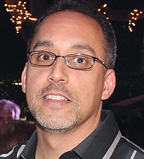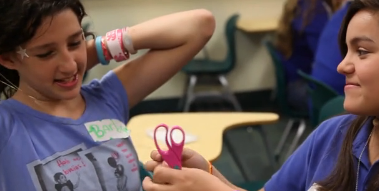Today, SevenPonds speaks with Peter Willig, the Director of Operations and Marketing at the Children’s Bereavement Center (CBC). The center is based in Miami, Florida, with counseling services available in the Coconut Grove, Miami Shore, Broward areas and more. The CBC’s mission statement embodies their commitment to helping children in the grieving process: to restore a sense of hope for the future to children and families who have lost a loved one.
MaryFrances: What is the history of the CBC?
Peter: We started with eight kids from five different families in the first year for bereavement counseling. We now serve about 800 total participants, with 54 groups a month across five primary sites. We have groups for younger elementary [school children], kindergarten through second grade and groups for middle school and high school. We also have a young adult program for college age and beyond; say there’s an 18 or even 35 year-old who doesn’t have children of their own in the program, but has lost someone and needs support. We have many adult services for those caregivers, whether they’re an aunt or an uncle. The entire family system is really served by this model.
Currently, we have three primary locations. One is at a school called Ransom Everglades in Coconut Grove. We have a second with a fully-fledged family program in Miami Shore at a school and a third that we just opened in Broward county at their Early Childhood Development center. We’re proud of our growth but unfortunately it reflects a real need in the community.
MaryFrances: What role do you play at the center?
Peter: Today? The business card changes from month to month! Essentially, I’m listed as the Chief Operating Officer. I’m tasked with overseeing all of the logistics of the programs. I help with [the] coordination of the community outreach and any training that goes on, as well as our growth and our expansion. Maintaining the quality of our services is also very important. We are a small, volunteer-based non-profit.
MaryFrances: What kind of setting do you counsel the children in?
Peter: What we recognized early on is that kids are not generally comfortable going to a hospital or clinical setting — it implies that something is wrong with them. [A hospital] might have also been where the loss actually occurred. The same goes for churches and synagogues; while comforting for [children], they’re not always as comfortable for the kids, because that’s where the memorial might’ve taken place.
“What we recognized early on is that kids are not generally comfortable going to a hospital or clinical setting — it implies that something is wrong with them”
Kids are often most comfortable in a school setting. So we partner with private schools, which allows them to give back to the community and not be, perhaps, such an elite institution — because anybody can access our programs on their campus.
MaryFrances: How long does a program typically last?
Peter: We’re not a closed, curriculum-based program. We don’t believe kids just finish eight sessions and they’re good. We really are of the philosophy that grief is an ongoing experience, especially for kids. They grieve developmentally, throughout their lifetime. What we try to provide are ongoing services [and] support that they can come to as long or as often as they want. Families really do stay connected to us — they might participate for a full program year, take a long break and come back in another developmental stage for a child or family member.
Peter’s 5 Tips on Approaching Bereavement Care with a Child:
1) We need to be honest with kids by being more concrete about death. That means using words like “death,” and “the body stops working,” instead of, “we’ve lost grandpa,” because then the question is, “Why can’t we go find grandpa?”
2) We should look at death as a healthy adjustment, rather than something that needs to be remedied, fixed, or put away. We need to get past a belief that anybody should just go through six months of counseling and be done.
3) We also have to understand that kids have big feelings. We need to encourage them to have conversations about those feelings, not just lectures. There’s magic in that. They really have a wealth of understanding that we don’t give them credit for.
4) The key to getting past sadness is finding its alternative, which is fun; it’s getting outside and turning off the news and not over-indulging in the negative part of [grieving]. There’s two sides to the coin: yes, we need to be sad. But we also have to focus on the restoration based behaviour.
5) It’s okay to laugh, to remember and tell stories. In that way you can continue your relationship with the person that’s died. They continue to be a part of the family culture through those stories.
MaryFrances: What is your approach to helping a grieving child? What are some of the tools you use to heal?
Primarily, we are a peer support model. So we’re not delivering clinical services — we’re not trying to “fix” symptoms. We’re not trying to get people to stop crying. We’re not trying to get them to do anything other than adjust, in a healthy way, to their loss.
We’re very activity-based for the young kids. For elementary and middle school kids we might start with an “opening circle” and close with this kind of circle ritual as well. For them, we’re really rooted in play, story telling and arts and crafts activities. The kids open up whenever they’re ready; they are very clearly told that having conversations on their loss is not a requirement. Feeling a sense of connection and normalcy with others — that’s enough for us.
“The kids open up whenever they’re ready; they are very clearly told that having conversations on their loss is not a requirement. Feeling a sense of connection and normalcy with others — that’s enough for us.”
Those at the middle school, high school and adult level generally like conversation more than anything. And to be honest, the conversations that they have are not just about death—we’re not here to relive the experience of loss, necessarily. We really talk about life more than anything else.
MaryFrances: Do you have a unique CBC story you’d like to share?
Peter: One that touches me personally was a young lady who came to the program in its beginning years. She had had this tragic loss at the age of eight in an auto-accident. Her mother, grandmother and her baby brother were killed — she was the only survivor and came to the center with her father a few weeks afterwards. And believe it or not, she was the life of the party. Every time she came she was helpful and nurturing others.
They participated with us for about two years. And as the dad started to collect himself at the end of the first year — getting back to work and everything — then she really took her turn grieving more emotionally and outwardly. They stayed in touch and she’s been a great help to the center. We just heard that she’s gone off to college in North Carolina! She’s kind of the icon for how health and growth can happen in the most tragic of circumstances.
MaryFrances: Thanks so much, Peter!
Peter: Thank you!
Related:

 What is Child Bereavement Care? An Interview with Peter Willig
What is Child Bereavement Care? An Interview with Peter Willig




 “As Tears Go By” by Marianne Faithfull
“As Tears Go By” by Marianne Faithfull
 “The Sea” by John Banville
“The Sea” by John Banville
 Funeral Favors Offer Visitors a Tangible Memento
Funeral Favors Offer Visitors a Tangible Memento















